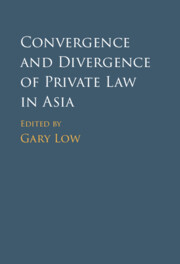Book contents
- Convergence and Divergence of Private Law in Asia
- Convergence and Divergence of Private Law in Asia
- Copyright page
- Dedication
- Contents
- Tables
- Contributors
- Acknowledgments
- Abbreviations
- 1 Introduction
- 2 Uniform Law and the Production and Circulation of Legal Models
- 3 Convergence, Divergence and Diversity in Financial Law: The Experience of the UNCITRAL Model Law and Cross-Border Insolvency
- 4 The New York Convention and the UNCITRAL Model Law on International Commercial Arbitration: Existing Models for Legal Convergence in Asia?
- 5 Convergences and Divergences: Comparing Contractual and Organizational Models in International Regulatory Cooperation
- 6 Law as a Market Standard: Voluntary Unification in Contract and Company Law
- 7 Is the Harmonisation of Asian Contract Law Possible? The Example of the European Union
- 8 The Presumption of Regularity in Chinese Corporate Contracting: Evidence and the Prospect of Regional Convergence
- 9 Mind the Gap: Studying the Implementation Discrepancy for the ASEAN Economic Community
- 10 The Rule of Law as Key to the ASEAN Legal Order: How Can It Be Ensured?
- 11 How Asian Should Asian Law Be?
- Index
4 - The New York Convention and the UNCITRAL Model Law on International Commercial Arbitration: Existing Models for Legal Convergence in Asia?
Published online by Cambridge University Press: 17 February 2022
- Convergence and Divergence of Private Law in Asia
- Convergence and Divergence of Private Law in Asia
- Copyright page
- Dedication
- Contents
- Tables
- Contributors
- Acknowledgments
- Abbreviations
- 1 Introduction
- 2 Uniform Law and the Production and Circulation of Legal Models
- 3 Convergence, Divergence and Diversity in Financial Law: The Experience of the UNCITRAL Model Law and Cross-Border Insolvency
- 4 The New York Convention and the UNCITRAL Model Law on International Commercial Arbitration: Existing Models for Legal Convergence in Asia?
- 5 Convergences and Divergences: Comparing Contractual and Organizational Models in International Regulatory Cooperation
- 6 Law as a Market Standard: Voluntary Unification in Contract and Company Law
- 7 Is the Harmonisation of Asian Contract Law Possible? The Example of the European Union
- 8 The Presumption of Regularity in Chinese Corporate Contracting: Evidence and the Prospect of Regional Convergence
- 9 Mind the Gap: Studying the Implementation Discrepancy for the ASEAN Economic Community
- 10 The Rule of Law as Key to the ASEAN Legal Order: How Can It Be Ensured?
- 11 How Asian Should Asian Law Be?
- Index
Summary
A number of questions arise when disputes occur between corporations in two different countries to be settled by arbitration in a third country. First, if a dispute arises, and one of the parties refuses to arbitrate, where is such an arbitration agreement to be enforced? Second, which court will have such jurisdiction? Third, if there is an arbitration that leads to an award of damages and costs, how is that award to be enforced against the losing party if the losing party refuses to voluntarily implement the award? Fourth, again, which court has such jurisdiction? It was in these circumstances that various international rules, treaties and conventions were enacted. Hwang traces the success of two remarkable uniform law instruments – the New York Convention and the UNCITRAL Model Law on International Commercial Arbitration – the cornerstones of international commercial arbitration. He notes the reasons for their relative success and widespread adoption, and while highlighting shortcomings, reflects whether these are fundamental enough to require revision of the instruments. Hwang concludes that while not perfect, nothing ever is: both instruments are exemplary in their goal to harmonise and improve arbitration laws.
- Type
- Chapter
- Information
- Convergence and Divergence of Private Law in Asia , pp. 62 - 80Publisher: Cambridge University PressPrint publication year: 2022



